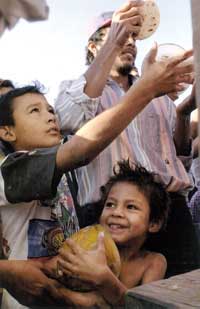SAMARITAN'S PURSE USING US RELIEF AID TO CONVERT CATHOLIC EARTHQUAKE VICTIMS TO FUNDAMENTALIST CHRISTIANITY

El Salvador Earthquake 2001
|
U.S. Aids Conversion-Minded Quake Relief in El Salvador
By DAVID GONZALEZ
NEW YORK TIMES
MARCH 5, 2001
GUADALUPE, El Salvador, March 3 — An American evangelical relief group that is using private donations and United States government money to help victims of two earthquakes has blurred the line between church and state as its volunteers preach, pray and seek converts among people desperate for help.
Residents of several villages said volunteers from Samaritan's Purse, which has received more than $200,000 from the United States Agency for International Development and is to receive a second similar amount, has held half-hour prayer meetings before showing them how to build temporary homes of metal and plastic provided by the American government.

According to interviews with numerous villagers here and elsewhere in this predominantly Roman Catholic country, volunteers of the Protestant group have distributed religious tracts and asked them to accept Jesus Christ as their savior.
"They said a lot, but the principal thing was God and that earthly things do not matter," said Óscar Romero, a villager putting finishing touches on his house.
Officials of Samaritan's Purse note that the group does not condition its help on acceptance of specific religious belief, adding that it has brought considerable private resources here, which they may use in any manner. The message it spreads is not seen as unusual in this deeply religious country, but it is spread in a society where Catholics and evangelical sects have long been at odds.
The group's use of federal financing has troubled aid officials and relief workers, who said the mixing of relief and religion could possibly conflict with contract guidelines. That issue comes as federal agencies are trying to adapt to President Bush's plan to provide government aid to religious groups involved in social services.
"It may very well be that this is a very fuzzy area right now," said Kenneth Ellis, the director of the Agency for International Development mission in El Salvador . "I know our legal office in Washington is struggling with how do we deal with faith-based organizations."
Government money cannot be used to overtly finance religious activities or to provide selective help based on political or religious beliefs, said Kim Walz, a spokeswoman for the agency in Washington .
The agency's federal counsel has also written that religious groups should not "promote religion at the public expense by using U.S. government funds or U.S. government-financed goods or services to promote sectarian purposes."
Dr. Paul Chiles, the country director for Samaritan's Purse, said the group neither discriminates nor proselytizes aggressively. At the same time, he said that its mission was understood and accepted by the federal government, which is helping it build more than 2,000 homes.
"We are first a Christian organization and second an aid organization," he said. "We can't really separate the two. We really believe Jesus Christ told us to do relief work."
He said that although the group did not rely on prayer meetings when delivering aid, he did not think it was inappropriate to deliver a message of hope to people for whom religion is part of daily life.
"We definitely don't ever use the gifts that we bring as a means to change people," he said. "We distribute it to people in need. At the same time, we bring the message of the Gospel."
That message is central to its relief work, according to the group's Web page, which quotes its president and chairman, Franklin Graham, son of the evangelist Billy Graham. The Web page notes that in one village where the group provided supplies, 150 Salvadorans converted after watching a movie about Jesus.

Exploiting people when they are most vunerable
"When we go into these villages and help people get back into their homes, we hope we'll be able to plant new churches all over this country," Franklin Graham said on the Web page.
Unlike other religiously affiliated relief groups, who try to team up with local groups expert in housing or community development, Samaritan's Purse has drawn volunteers from local evangelical congregations. "When we build things, we say we build it with the love of Jesus, because that's why we are here," Dr. Chiles said. "If we worked with the Peace Corps or the Red Cross, I don't think they would be comfortable doing this."
Such statements have raised suspicion among many relief workers here, who noted that other religiously affiliated relief groups had spun off their relief work into separate entities that received federal financing.
The 31-year-old group is a newcomer to housing work in El Salvador , but it has worked in more than 100 countries, including Honduras , where it built 5,000 homes after Hurricane Mitch.
Senator Jesse Helms, the chairman of the Foreign Relations Committee and a critic of the Agency for International Development, has held up Samaritan's Purse as an exemplary religious relief group. Some American relief officials privately complain that members of Congress have put pressure on them to finance the group's work, even though they have serious reservations about its proselytizing.
"It's easier to fund them rather than make enemies," said one official who insisted on anonymity.
Officials noted that Samaritan's Purse met performance goals, and that there was therefore no reason — aside from the religious reservations — not to finance it. Still, others worried that the group walked a very fine line.
"They are hitting these people when they most vulnerable," said one relief worker long active in the region. "It may not be pressure, but it sure is taking advantage of a period in people's life when they will do anything like that to get a house."
Villagers who received houses were grateful and did not think the religious message was improper.
"They come to preach the word of God and to receive the word of God," said Iris Yolanda Minero Flores, a health worker in San Román. "It is a comfort and helps give us strength. We all have to accept the word first, then receive what people send."
Dr. Chiles insisted that his group was not looking for converts, and that need was the only criterion for help. The conversion of 150 people mentioned on Samaritan's Purse's Web page is credited to the pastor of a local evangelical denomination that is the group's aid partner.
The seeking of converts has been a sore point among El Salvador 's Roman Catholic majority. In recent weeks, local clergy members said, relations between the two groups have again been rocky, because some local evangelical groups have conditioned aid on accepting their religion.
"They see this as something where God speaks to the people," said Bishop Elías Bolaños, the Catholic prelate of Zacatecoluca. "They have started campaigns of preaching, bringing people together every day to say God is punishing them. They are very pessimistic."
SOURCE: http://www.nytimes.com/2001/03/05/world/05SALV.html
U.S. Cautions Group on Mixing Religion and Salvador Quake Aid
By DAVID GONZALEZ
NEW YORK TIMES
MARCH 8, 2001
MIAMI , March 7 — The United States Agency for International Development has told an American evangelical group building emergency shelters in earthquake-ravaged El Salvador that it has to avoid the appearance that it is mixing religious and relief activities.
Representatives of the group, Samaritan's Purse, which has an agreement with the aid agency to build $202,000 of metal and plastic shelters, with a similar amount pending, held prayer sessions in several villages before showing residents how to build the housing. The help was not contingent on accepting the group's message nor its call to accept Jesus. But the timing worried aid officials and other relief workers in the region.
In a statement issued today in Washington, the agency said that Samaritan's Purse had not violated federal guidelines and had a good track record, but it emphasized that the group had to "maintain adequate and sufficient separation between its prayer sessions and its U.S.A.I.D.- funded activities," to avoid the appearance that federal money was being used to finance proselytizing.
"We're not comfortable with them having a half-hour prayer session right before instructing people how to build shelters," an agency official said. "We'd like them to separate their activities from our activities."
The international director of projects at the group, Ken Isaacs, said that "a few overenthusiastic people" had conducted the prayer sessions, which he said was against the group's policy. The group has been working with a local evangelical denomination in El Salvador that provided volunteers.
"We do not hold people captive while they hear a message before they receive aid," Mr. Isaacs said. "As soon as we identified it, we clarified it."
Clarifying the extent of religious activity under federal guidelines may prove difficult. The Agency for International Development statement said that it could not finance programs with "significant religious/proselytizing purpose or content" and "will only finance programs that have a secular purpose and which do not have the primary effect of advancing religion."
The aid agency official said that determining a suitable separation of activities would be considered case by case but that having simultaneous religious and relief work might not be acceptable, even if no federal money was used for evangelization.
A spokesman for Samaritan's Purse, Mark DeMoss, said that the relief work was motivated by faith and that the evangelical work was privately financed and exceeded federal assistance.
"There are some fine lines here that are difficult to draw," Mr. DeMoss said. "In any place Samaritan's Purse is working, given the relative size of U.S.A.I.D. money and private funding, anywhere Samaritan's Purse works there is going to be on that site religious activity taking place."
He added that the group's president and chairman, Franklin Graham, would rather do without federal funds than abandon religious principles. "The fundamental question is," Mr. Graham asked, "is it practical, is it appropriate, to expect an organization who does what they do because of their belief system — which then becomes their ethos — is it fair to ask them to do that but not to share their belief system or ethos that motivates them?
"Our position on it is that it is not fair. Nor is it correct to ask us to do what we do, but lock our faith in the closet."
SOURCE: http://www.nytimes.com/2001/03/08/world/08QUAK.html
Ministry accused of mixing religion with quake relief Associated Press
Last Updated: March 8, 2001
Charlotte , N.C. - Federal officials responded to a possible link between a ministry's prayer sessions and relief it provided to earthquake victims in El Salvador , warning the organization that it cannot mix evangelism and government-funded assistance.
The U.S. Agency for International Development said Wednesday it intends to work with North Carolina-based Samaritan's Purse to ensure that it maintains "adequate and sufficient separation between its prayer sessions and its USAID -funded activities."
Samaritan's Purse, which distributes aid gathered through private donations and public grants, has denied using federal money to support its religious activities. It has received more than $200,000 from the agency to provide relief in El Salvador .
The group's president, the Rev. Franklin Graham, the son of evangelist Billy Graham, wrote a letter to the agency Wednesday promising to cooperate.
"We have always been in full compliance with the USAID regulations, and we will look forward to continue working together wherever possible," said spokesman Mark DeMoss.
The New York Times reported this week that workers from Samaritan's Purse held half-hour prayer sessions with El Salvador villagers before teaching them how to build temporary housing provided by the U.S. government.
An agency policy prohibits the support of activities with a significant religious content.
Despite the dispute, leaders of the Protestant evangelical group, which reported a budget of $134 million last year, say the ministry will continue to make evangelism its top priority.
" Franklin is very up-front about this, that when we give someone food or water, we're telling them our motivation, that we feel like God loves us and God loves them," said spokesman Jeremy Blume.
The issue of mixing state aid with church outreach is especially sensitive as federal agencies try to adapt to President Bush's plan to provide government aid to religious groups involved in social services.
SOURCE: http://www.jsonline.com/lifestyle/religion/mar01/religion-rel030801.asp
[ MORE ARTICLES ]
[ CAMPAIGN HOME PAGE ] |
